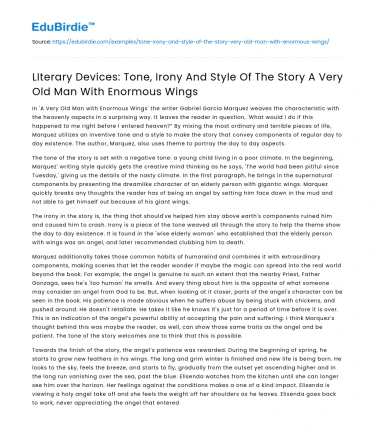In 'A Very Old Man with Enormous Wings' the writer Gabriel Garcia Marquez weaves the characteristic with the heavenly aspects in a surprising way. It leaves the reader in question, 'What would I do if this happened to me right before I entered heaven?” By mixing the most ordinary and terrible pieces of life, Marquez utilizes an inventive tone and a style to make the story that convey components of regular day to day existence. The author, Marquez, also uses theme to portray the day to day aspects.
The tone of the story is set with a negative tone: a young child living in a poor climate. In the beginning, Marquez' writing style quickly gets the creative mind thinking as he says, 'The world had been pitiful since Tuesday,' giving us the details of the nasty climate. In the first paragraph, he brings in the supernatural components by presenting the dreamlike character of an elderly person with gigantic wings. Marquez quickly breaks any thoughts the reader has of being an angel by setting him face down in the mud and not able to get himself out because of his giant wings.
Save your time!
We can take care of your essay
- Proper editing and formatting
- Free revision, title page, and bibliography
- Flexible prices and money-back guarantee
The irony in the story is, the thing that should've helped him stay above earth's components ruined him and caused him to crash. Irony is a piece of the tone weaved all through the story to help the theme show the day to day existence. It is found in the 'wise elderly woman' who established that the elderly person with wings was an angel, and later recommended clubbing him to death.
Marquez additionally takes those common habits of humankind and combines it with extraordinary components, making scenes that let the reader wonder if maybe the magic can spread into the real world beyond the book. For example, the angel is genuine to such an extent that the nearby Priest, Father Gonzaga, sees he's 'too human' He smells. And every thing about him is the opposite of what someone may consider an angel from God to be. But, when looking at it closer, parts of the angel's character can be seen in the book. His patience is made obvious when he suffers abuse by being stuck with chickens, and pushed around. He doesn't retaliate. He takes it like he knows it's just for a period of time before it is over. This is an indication of the angel’s powerful ability of accepting the pain and suffering. I think Marquez’s thought behind this was maybe the reader, as well, can show those same traits as the angel and be patient. The tone of the story welcomes one to think that this is possible.
Towards the finish of the story, the angel’s patience was rewarded. During the beginning of spring, he starts to grow new feathers in his wings. The long and grim winter is finished and new life is being born. He looks to the sky, feels the breeze, and starts to fly, gradually from the outset yet ascending higher and in the long run vanishing over the sea, past the blue. Elisenda watches from the kitchen until she can longer see him over the horizon. Her feelings against the conditions makes a one of a kind impact. Elisenda is viewing a holy angel take off and she feels the weight off her shoulders as he leaves. Elisenda goes back to work, never appreciating the angel that entered her life out of the blue and left just as unexpectedly.
With the tone that the writer sets in the ending, the reader is left wondering how often they stop and thank God for the angels and blessings in our life. How often am I blessed with something amazing and I don’t see it or thank God for it? With his utilization of magic realism, Gabriel Garcia Marquez opens the entryway to fascinating exchange and welcomes the reader to not just enter a position of a creative mind, but to see the angel in our day to day.






 Stuck on your essay?
Stuck on your essay?

